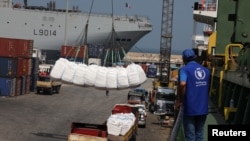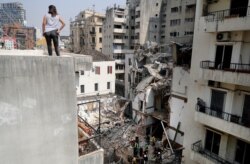The United Nations World Food Program has announced it will help pay expenses for people affected by the massive explosion that tore through Lebanon's capital city of Beirut in August.
Approximately 50,000 people, or 10,000 families, will be eligible to participate in the WFP program, which will provide funds to meet basic needs, such as food and health care, the agency said in a press release Thursday. Vulnerable families began to receive LBP 1,680,000, which is approximately $250 at a preferential exchange rate, each month in mid-September; the operation is expected to last roughly six months.
The cash assistance program was spearheaded by the WFP in close collaboration with the Lebanese Red Cross and the Lebanese non-governmental organization SHIELD.
"The blast came as Lebanon was dealing with two other severe shocks: the ongoing economic crisis and the impact of the COVID-19 lockdown measures. Families have been struggling to meet their basic needs even prior to the explosion," WFP Representative and Country Director in Lebanon Abdallah Alwardat said in the statement.
Prior to this operation, the World Food Program distributed over 2,200 food parcels to 7,600 people in neighborhoods surrounding the blast. Kitchens have also provided more than 3,000 meals a day for affected families and volunteers.
The WFP also subsidized things like flour and the price of bread to ensure that Lebanese families are able to secure more food for the same price.
The blast, which killed at least 70 people and injured more than 3,500, destroyed much of the city's port, upon which Beirut's economy is heavily dependent. The official cause of the blast stems from a fire that broke out in a warehouse that held approximately 2,750 tons of ammonium nitrate, a highly explosive chemical compound. The explosive material is estimated to have been stored in the warehouse for at least six years.






